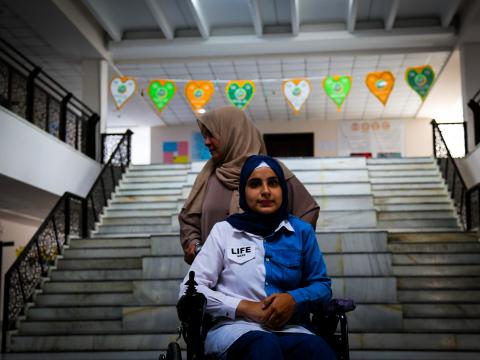Little Tabarak’s struggle at school to access her classroom

Tabark (14) was only two years of age when her father died. As Tabarak was born with disabilities, her mother couldn’t take care of her and therefore her grandmother, Samia*, (52) took care of her from a very young age. Ever since then, she lived in her grandmother’s house.
Samia has played a significant role at every stage of Tabarak’s life. “When she was a child, she was only crawling on the ground. I started to have back pain from carrying her on my back. But now as she has grown older, she uses the stick.”
Samia, despite her challenges, feels content that she has little Tabarak in her life, together supporting one another. Samia follows and supports Tabarak in every moment of her life, caring for her throughout the day and building a routine for her. She often helps Tabarak with walking to school, bathing, and dressing.
Tabarak today is in the sixth year of primary school. Tabarak is behind in schooling because when she reached school age, there were no schools which could accommodate children with disabilities. Moreover, then the principal of the school feared that the other children at the school might hurt Tabarak. However, after two years the principal called Samia telling her that Tabarak could join as she had grown a little older.
The school is one kilometer away from their home, and Samia walks Tabarak in a wheelchair every day to school and back home. It usually takes them 15 minutes to get to school on foot. However, at school it is very problematic as the classrooms are mostly on the upper floor. Samia often accompanies Tabarak on the stairs helping her reach her class. Because of the nature of the school building, Tabarak often does not go down from her classroom to enjoy free moments of recreation with her friends in the schoolyard as it is rather troublesome for her to get down and up the stairs. Tabarak said, “My wish is to be able to walk. I sometimes cannot go to the bathroom nor go to the yard of the school. I cannot do it on my own.” Tabarak often says, “God why have you created me like this?”
Samia sees the urgent need for schools to have accessible western style toilets, Samia said “We made her a western style toilet at home but at school we need western style toilets too. In addition, the school is built over two floors. It needs an elevator for children living with disabilities or to increase the capacity of ground floor classrooms. For the past six years, Tabarak has been struggling with the stairs.”
Samia today wants nothing much in life but to see happiness and peace on the face of Tabarak. Samia notes that despite her disabilities, Tabarak has a strong character and a strong will. She wants to be a pharmacist one day. In her free time, Tabarak likes to draw, and often draws her grandmother. Her favorite subjects are Arabic language and life sciences.
We believe it is critical to have accessible facilities to help children like Tabarak who are living with disabilities enjoy every moment at school like any other school child and feel confident and empowered. Through providing awareness sessions for children, government employees, and school staff about disability inclusion and sensitivity, targeting specific children living with disabilities and helping them feel empowered, children like Tabarak will have a completely different, safe environment to live in and flourish.
The legacy of conflict upon already vulnerable people - women, girls, and people living with disabilities - is an even more precarious situation, while limited opportunities and access to services and facilities are ongoing challenges. World Vision Iraq therefore seeks potential partnerships and funding opportunities further to help Iraqi people living with disabilities, women and girls at risk.
*Some of the names have been changed to protect identity.